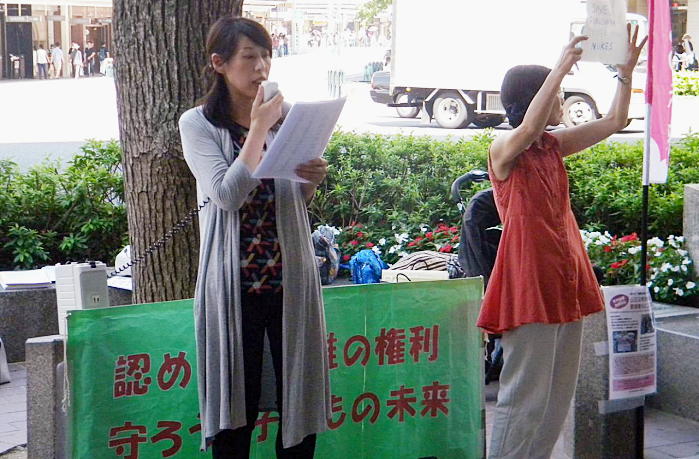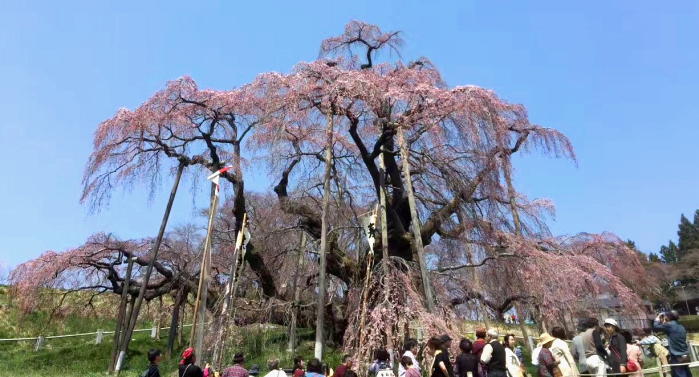|
||||
Sawako Mizuta When the huge earthquake happened on the 11th March 2011, I was working in Koriyama city in Fukushima Prefecture. My husband was on an overseas business trip, and our eight-year-old daughter was visiting her grandparents in China. The mega-earthquake was long and strong in a way that I had never known before. The shaking was so severe that I wasn't able to keep standing. Things fell down from shelves, and doors seemed to bend. My colleague shouted 'Run away, quick!' so I ran out from the building amidst continual big quakes. Then I heard the sound of an explosion, and the glass in the windows was blown out. In the car park I saw cars moving without drivers and smashing into each other in all directions. After that the electricity supply failed and mobile phones became disconnected as the network failed. Our boss told us that our priority should be checking our families' safety, so we all left and went back home. The traffic lights weren't working because of the power cut, so there was a major traffic jam. Luckily I was finally able to get home. Inside my house, a shelf had fallen down, various things were scattered, and several walls were cracked. Fortunately, my parents-in-law were safe. The aftershocks continued. Throughout the night my fear and loneliness stopped me sleeping. However the earthquake itself was not the greatest cause of dread. I was absolutely astonished when I saw the hydrogen explosion in the Fukushima Daiichi nuclear power station on a TV broadcast on the afternoon the 12th March 2011. Since I had moved to Japan from China 13 years before I had not even noticed that there were nuclear plants in Fukushima. I saw the Government announcements by Chief Cabinet Secretary Edano that "Radiation will not have any immediate effect on your health." I started to think "This disaster might be serious trouble, if we stayed here too long." In the night, my mother contacted me from China. She told me that the disaster in Japan was big news in China as well, and that we would not be safe in Fukushima because of the risk of radiation leaks. On the 13th March, my friend who also lived in Koriyama City came to Miharu-machi, where I lived, to wash clothes, because their water supply was cut off. She was told by her relative who was a member of the Self-Defense Force "You had better evacuate immediately. It is not safe to stay in Fukushima." She asked me to evacuate with her. I asked her if my parents-in-law could come with us. Straight away she contacted her parents who live in Kyoto [550km south west of Fukushima nuclear station], and asked if all of us could stay in their house. They said 'We can't do anything in particular to help you in this urgent situation, but please evacuate to our house.' On the 14th March, my company contacted me to come to work to help clean up the earthquake damage, so I went to work in the morning. But at 11 o'clock, the senior people suggested to me that "Tamura-gun Miharu-machi where you live is close to the nuclear power station, so you might be better to evacuate." Therefore I went home and discussed evacuation with my parents-in-law again. We gave up on the idea of them evacuating, as taking my father-in-law a long distance was very difficult because he is partially paralyzed. My mother-in-law said to me "You should evacuate, because you are young." In the evening, filled with tears I temporarily evacuated to my friend's family in Kyoto. On the 15th March, I learned new information. The Chinese embassy and the Chinese Consulate-General in Japan were preparing charter buses for Chinese people who wanted to go back to China. They were collected from designated places in Fukushima, Miyagi, Ibaraki and Iwate and taken to the airport. Also I knew from a friend's email that the US Embassy had given an evacuation advisory to US citizens who lived within an 80 kilometers radius from the Fukushima nuclear plant. In the night, I heard from my mother-in-law that protective iodine tablets were independently distributed to citizens in Miharu-machi by local officials [The only area in Japan that did so]. I finally realized that this situation was extremely serious and it was right to evacuate.
On the 20th March, I was asked to back to work. So I returned to Fukushima and started to work again from the 21st. However I quit my job on the 31st March. Before the disaster, we had planned that our daughter was supposed to come back to Japan from China in April in order to start her new school year. But she reluctantly decided to extend her stay in China in order to reassure us, her parents. I therefore evacuated to China on the 4th April. In China, I watched the TV news and read newspapers about the disaster in Japan. The Chinese media reported on the disaster frequently every day. In particular radiation leaks from the nuclear power plants and damage to them were given a lot of attention. I saw some very concerning explanations in reports, for example suggesting that nothing could be done to control the reactors. The Chinese government advised that Chinese citizens should not travel to Japan. I felt that overseas viewpoints and the Japanese government reports about the disaster were too different. I felt safe in China, but I started to think I wanted to take my daughter back to Fukushima where she was born and grew up. I missed our family in Japan, and wanted to know more about the situation in in our home area of Miharu-machi. As a result we returned to Fukushima in January 2012. I saw in the local town newsletter that the radiation level around the local hall near our house was 0.7µSv/ hour [This equates to 6.1 mSv per year, well above the international standard and Japanese legal limit of of 1mSv per year, and above the 5 mSv level for evacuation around Chernobyl, however Miharu-Machi was not an official evacuation zone]. I detected the same level in my bedroom with the Geiger counter that I had bought. The radiation dosage was still high, even though one year had passed since the disaster. I concluded that I needed to evacuate properly to a safer area away from the Fukushima Daiichi nuclear power plant. I got information that Kyoto Prefecture was receiving evacuees so I decided to evacuate to Kyoto again in May 2012. I talked about evacuation with my husband again and again, but we couldn't agree. Finally we were both completely exhausted and confused. In the end we decided to divorce, unable to achieve mental peace. Since then, I have continued to evacuate with my daughter. Because of the disaster and the anxiety it caused we have had to move several times. Also, I had to leave my work, and became divorced. I lost my life as I had known it and had to start from zero in Kyoto. I have two reasons for becoming a plaintiff as a victim of the nuclear disaster. Firstly, I want to know the truth of the Fukushima nuclear disaster. Did the Government tell us the facts without hiding information at the time? I want to accuse them. Seen from abroad, Japan is still not safe yet. Even now many countries have banned food imported from Kanto and Tohoku. China prohibited the import of foods and livestock feedstuff from ten prefectures. According to the international NGO Reporters Without Borders, Japan was 11th in the World Press Freedom Index in 2010. But after the Fukushima disaster, Japan dropped to 61st in 2015, 72th in 2016. Secondly, I seek confirmation that self-evacuation is right. Children are Japan's future. The need for a safe environment for parenting should be respected, and the validity of the choice of evacuation should be admitted. I hope that the Government and TEPCO take responsibility and compensate us for the damage done to us. They should take action that expresses a positive vision of Japan and the environment for future generations. Page top |
||||
| Copyright (C) 2017 Support group for plaintiffs and the Nuclear Power Plant Lawsuit for Compensation in Kyoto All Rights Reserved. |

